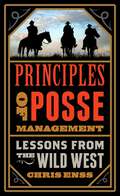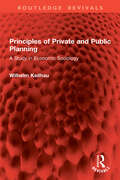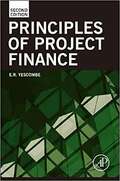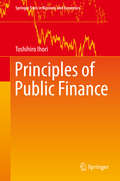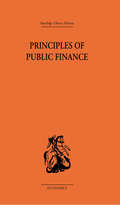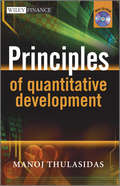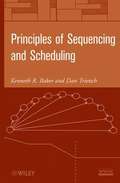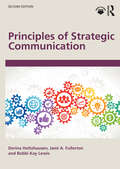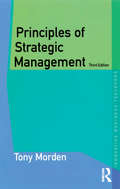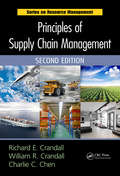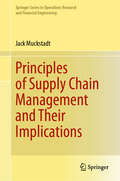- Table View
- List View
Principles of Pharmaceutical Marketing
by Mickey C. Smith Ph.D.Principles of Pharmaceutical Marketing, Third Edition offers the perspectives of both those who teach and those who practice pharmaceutical marketing. This reflects the need for and the effort to provide the most relevant “real world” approach to this complex and fascinating field. This text is designed for undergraduate students in pharmacy whose background in marketing is limited, those actually involved in pharmaceutical marketing, and anyone desiring an introduction to the intricacies involved in the marketing of pharmaceutical products.
Principles of Political Economy
by Wilhelm RoscherWilhelm Georg Friedrich Roscher was a German economist from Hanover. He studied at Göttingen, where he became a member of Corps Hannovera, and Berlin, and obtained a professorship at Göttingen in 1844, and subsequently at Leipzig in 1848. The main origins of the historical school of political economy may be traced to Roscher. Roscher tried to establish the laws of economic development by using the historical method from investigation of histories legal, political, cultural and other aspects, and developed a cyclical theory where nations and their economies pass though youth, manhood, and senile decay.
Principles of Political Economy and Taxation [1911 Edition]
by David RicardoThis landmark treatise formulated the guiding principles behind the market economy. Author Ricardo, with Adam Smith, founded the classical system of political economy, a school of thought that dominated economic policies throughout the 19th century and figured prominently in the theories of John Stuart Mill and Karl Marx.-Print ed.
Principles of Posse Management: Lessons from the Old West for Today's Leaders
by Chris EnssPrinciples of Posse Management tells the stories of the lawmen and leaders of the Old West who organized citizens in the pursuit of law and order. This collection of tales reveals what Wyatt Earp, Bat Masterson, and other legends of the old west knew about leadership with a clever twist on the classic shoot-em-up, black-hats-vs-white-hats tale.
Principles of Pricing
by Robert J. Dolan John T. GourvillePresents the basic principles of pricing, including value pricing, price sensitivity, and price customization/discrimination.
Principles of Private and Public Planning: A Study in Economic Sociology (Routledge Revivals)
by Wilhelm KeilhauPrinciples of Private and Public Planning (1951) looks at a key economic question: plan or no plan? By examining the economic theories of both planned and unplanned economies together with human and societal impulses, it aims to provide both an analysis and overview of the topic.
Principles of Product Policy
by Anita ElberseProvides an introduction to key product policy issues.
Principles of Project Finance
by E. R. YescombeThe Second Edition of this best selling introduction for practitioners uses new material and updates to describe the changing environment for project finance. Integrating recent developments in credit markets with revised insights into making project finance deals, the second edition offers a balanced view of project financing by combining legal, contractual, scheduling, and other subjects. Its emphasis on concepts and techniques makes it critical for those who want to succeed in financing large projects. With extensive cross references and a comprehensive glossary, the Second Edition presents anew a guide to the principles and practical issues that can commonly cause difficulties in commercial and financial negotiations. <p><p> <ul> <li>Provides a basic introduction to project finance and its relationship with other financing techniques</li> <li>Describes and explains: sources of project finance; typical commercial contracts (e.g., for construction of the project and sale of its product or services) and their effects on project finance structures; project finance risk assessment from the points of view of lenders, investors, and other project parties; how lenders and investors evaluate the risks and returns on a project; the rôle of the public sector in public private partnerships and other privately financed infrastructure projects; how all these issues are dealt with in the financing agreements</li> </ul>
Principles of Project and Infrastructure Finance
by Willie TanCurrent books on project finance tend to be non-technical and are either procedural or rely heavily on case studies. In contrast, this textbook provides a more analytical perspective, without a loss of pragmatism. Principles of Project and Infrastructure Finance is written for senior undergraduates, graduate students and practitioners who wish to know how major projects, such as residential and infrastructural developments, are financed. The approach is intuitive, yet rigorous, making the book highly readable. Case studies are used to illustrate integration as well as to underscore the pragmatic slant.
Principles of Public Finance
by Toshihiro IhoriThis textbook equips instructors and students with an overview of the existing literature so that the latter can attain an overall understanding of macroeconomic and microeconomic public finance. The literature on public finance has grown dramatically with theoretical studies and empirical analysis, and much of the focus has been on macroeconomic effects of public services. The standard textbook offerings, however, are mainly restricted to microeconomic topics of public finance. This text intends to fill this gap by presenting a theoretical-based, comprehensive explanation of public finance. Particular emphasis is directed at developing tools that can be applied theoretically and empirically to clarify essential economic concerns in the current public sector in advanced countries, including Japan. Such concerns include the macroeconomic effect of fiscal policy, the dependence on bonds for covering government deficits, and social security reform. The main text explains the standard concepts of public finance, and the appendix offers various advanced topics. The material will facilitate an understanding of how to investigate changes in the public sector, interpret results, and basically do research on fiscal policy. The textbook will be of value to a broad range of course offerings, including those generally focused on fiscal policy, on social security reform and on tax reform.
Principles of Public Finance (Routledge Library Editions)
by Hugh Dalton'Dalton has succeeded in expressing general economic concepts in simple language' The Economist. The 1971 edition of this famous textbook includes recent material to the general survey on the theory of taxation, other forms of public revenue, public expenditure and public debts. There are chapters on modern theories of budgetary policy and the controversial cheap money policy, pursued by the author when he was in charge of the British Treasury from 1945-1947.
Principles of Public Speaking
by Kathleen GermanBalancing skills and theory, this introductory public speaking textbook encourages the reader to see public speaking as a way to build community in today’s diverse world. Within a framework that emphasizes speaker responsibility, listening, and cultural awareness, this classic book uses examples from college, workplace, political, and social communication to make the study of public speaking relevant, contemporary, and exciting. This new edition includes expanded coverage of mediated speaking with examples from podcasts and online speaking contexts; discussion of ethical issues of contemporary public discourse, including disinformation and public civility; and tips for extemporaneous speaking. This textbook is ideal for general courses on public speaking as well as specialized programs in business, management, political communication, and public affairs. A companion website including an instructor’s manual containing discussion questions, exercises, quiz questions, and suggestions for syllabus design is available at www.routledge.com/cw/german.
Principles of Quantitative Development
by Manoj ThulasidasPrinciples of Quantitative Development is a practical guide to designing, building and deploying a trading platform. It is also a lucid and succinct exposé on the trade life cycle and the business groups involved in managing it, bringing together the big picture of how a trade flows through the systems, and the role of a quantitative professional in the organization.The book begins by looking at the need and demand for in-house trading platforms, addressing the current trends in the industry. It then looks at the trade life cycle and its participants, from beginning to end, and then the functions within the front, middle and back office, giving the reader a full understanding and appreciation of the perspectives and needs of each function. The book then moves on to platform design, addressing all the fundamentals of platform design, system architecture, programming languages and choices. Finally, the book focuses on some of the more technical aspects of platform design and looks at traditional and new languages and approaches used in modern quantitative development.The book is accompanied by a CD-ROM, featuring a fully working option pricing tool with source code and project building instructions, illustrating the design principles discussed, and enabling the reader to develop a mini-trading platform.The book is also accompanied by a website http://pqd.thulasidas.com that contains updates and companion materials.
Principles of Radical Decentralization: Moving Beyond Budgeting
by Jeremy Hope Robin FraserIt is not difficult to see why the budgeting process is such a barrier to effective empowerment. It restricts decision making to specified plans and budgets, and it assumes the absence of trust. This chapter outlines some common principles that leaders have used to remove these barriers to empowerment and transform their organizations.
Principles of Retailing
by Christopher Moore John Fernie Suzanne FernieRetailing is one of the biggest and most important sectors in today's economy. Graduates who are seeking a career in the sector will therefore require a solid knowledge of its core principles. The Principles of Retailing Second Edition is a topical, engaging and authoritative update of a hugely successful textbook by three leading experts in retail management designed to be a digestible introduction to retailing for management and marketing students. The previous edition was praised for the quality of its coverage, the clarity of its style and the strength of its sections on operation and supply chain issues such as buying and logistics, which are often neglected by other texts. This new edition has been comprehensively reworked in response to the rapid changes to the industry, including the growth of online retail and the subsequent decline of physical retail space and new technologies that improve customer experience and help track consumer behaviour. It also builds upon the authors' research over the last decade with new chapters on offshore sourcing and CSR and product management in addition to considerable revisions to existing chapters to highlight changes in online retailing and e-tail logistics, retail branding, retail security, internationalisation and the fashion supply chain. This edition will also be supported by a collection of online teaching materials to help tutors spend less time preparing and more time teaching.
Principles of Security and Crime Prevention
by Clifford W. Van Meter Truett A. Ricks Pamela A. CollinsThis introductory text provides a thorough overview of the private security system. This edition includes crime prevention and its zones of protection - the theoretical framework that provides the bridge between private and public sector law enforcement. From the historical development and the professional nature of security and crime prevention to the legal aspects of private security, this well-rounded text covers basic elements of security and crime prevention.
Principles of Sequencing and Scheduling
by Kenneth R. Baker Dan TrietschAn up-to-date and comprehensive treatment of the fundamentals of scheduling theory, including recent advances and state-of-the-art topicsPrinciples of Sequencing and Scheduling strikes a unique balance between theory and practice, providing an accessible introduction to the concepts, methods, and results of scheduling theory and its core topics. With real-world examples and up-to-date modeling techniques, the book equips readers with the basic knowledge needed for understanding scheduling theory and delving into its applications. The authors begin with an introduction and overview of sequencing and scheduling, including single-machine sequencing, optimization and heuristic solution methods, and models with earliness and tardiness penalties. The most current material on stochastic scheduling, including correct scheduling of safety time and the use of simulation for optimization, is then presented and integrated with deterministic models. Additional topical coverage includes:Extensions of the basic modelParallel-machine modelsFlow shop schedulingScheduling groups of jobsThe job shop problemSimulation models for the dynamic job shopNetwork methods for project schedulingResource-constrained project schedulingStochastic and safe schedulingExtensive end-of-chapter exercises are provided, some of which are spreadsheet-oriented, and link scheduling theory to the most popular analytic platform among today's students and practitioners--the Microsoft Office Excel® spreadsheet. Extensive references direct readers to additional literature, and the book's related Web site houses material that reinforces the book's concepts, including research notes, data sets, and examples from the text.Principles of Sequencing and Scheduling is an excellent book for courses on sequencing and scheduling at the upper-undergraduate and graduate levels. It is also a valuable reference for researchers and practitioners in the fields of statistics, computer science, operations research, and engineering.
Principles of Sequencing and Scheduling (Wiley Series in Operations Research and Management Science)
by Kenneth R. Baker Dan TrietschAn updated edition of the text that explores the core topics in scheduling theory The second edition of Principles of Sequencing and Scheduling has been revised and updated to provide comprehensive coverage of sequencing and scheduling topics as well as emerging developments in the field. The text offers balanced coverage of deterministic models and stochastic models and includes new developments in safe scheduling and project scheduling, including coverage of project analytics. These new topics help bridge the gap between classical scheduling and actual practice. The authors—noted experts in the field—present a coherent and detailed introduction to the basic models, problems, and methods of scheduling theory. This book offers an introduction and overview of sequencing and scheduling and covers such topics as single-machine and multi-machine models, deterministic and stochastic problem formulations, optimization and heuristic solution approaches, and generic and specialized software methods. This new edition adds coverage on topics of recent interest in shop scheduling and project scheduling. This important resource: Offers comprehensive coverage of deterministic models as well as recent approaches and developments for stochastic models Emphasizes the application of generic optimization software to basic sequencing problems and the use of spreadsheet-based optimization methods Includes updated coverage on safe scheduling, lognormal modeling, and job selection Provides basic coverage of robust scheduling as contrasted with safe scheduling Adds a new chapter on project analytics, which supports the PERT21 framework for project scheduling in a stochastic environment. Extends the coverage of PERT 21 to include hierarchical scheduling Provides end-of-chapter references and access to advanced Research Notes, to aid readers in the further exploration of advanced topics Written for upper-undergraduate and graduate level courses covering such topics as scheduling theory and applications, project scheduling, and operations scheduling, the second edition of Principles of Sequencing and Scheduling is a resource that covers scheduling techniques and contains the most current research and emerging topics.
Principles of Solar Gas Turbines for Electricity Generation (Green Energy and Technology)
by Amos MadhlopaThis is the first book dedicated to solar gas turbines, providing fundamental knowledge and state-of-the-art developments in the field. A gas turbine is a heat engine in which a mixture of fuel and air is burned in a chamber that is an integral part of the flow circuit of the working fluid. The burnt gas mixture expands and turns the turbine, which can be connected to a generator for electricity production. Solar gas turbines offer an important alternative to conventional gas turbines driven by non-renewable, polluting fossil fuels such as diesel or natural gas. The book provides a comprehensive overview of the topic as well as numerous illustrations.
Principles of Solar Gas Turbines for Generating Electricity (Green Energy and Technology)
by Amos Madhlopa Richard NkhomaThis book, now in its second expanded and updated edition, is dedicated to solar gas turbines, providing fundamental knowledge and state-of-the-art developments in the field. A gas turbine is a heat engine in which a mixture of fuel and air is burned in a chamber that is an integral part of the flow circuit of the working fluid. The burnt gas mixture expands and turns the turbine, which can be connected to a generator for electricity production. Solar gas turbines offer an important alternative to conventional gas turbines driven by non-renewable, polluting fossil fuels such as diesel or natural gas. The book provides a comprehensive overview of the topic as well as numerous illustrations. The second edition provides step-by-step linchpins from fundamentals to advanced concepts of solar gas turbines. The book features methods of designing and testing of this green technology. It includes economic and environmental considerations of solar gas turbines that are crucial for sustainable energy production. In addition, worldwide case studies on the development of solar gas turbines are presented in this book and each chapter contains worked examples.
Principles of Strategic Communication
by Derina Holtzhausen Jami Fullerton Bobbi Kay Lewis Danny ShipkaDesigned to support the paradigm shift in media and communication, this book presents the basic tenets of strategic communication and its foundational disciplines of advertising, public relations, and marketing communications. Drawing on the latest research in the field, the text introduces students to the theories of strategic communication while at the same time outlining how to apply them to everyday practice. To facilitate learning and tie concepts to practice, each chapter includes introductory focus questions, a contemporary global case study, a career profile of a current practitioner, end-of-chapter discussion questions, and features that highlight how research methods can be applied to strategic communication practice. Principles of Strategic Communication is ideal as a core text for undergraduate students in strategic communication courses within media, communication, marketing, and advertising programs. The accompanying online support material features chapter summaries, useful links to examples of strategic communication in action, suggested further reading, and practice test questions. Instructors will find an instructor’s resource manual that includes sample syllabi, class activities, lecture topics, and a test bank.
Principles of Strategic Communication
by Derina Holtzhausen Jami Fullerton Bobbi Kay LewisNow in a second edition, this book introduces students to the theories of strategic communication and their application to everyday practice.Key updates to the second edition include the use of artificial intelligence in the practice of strategic communication and a focus on health communication and crisis communication in the wake of a global pandemic, personal branding, social responsibility in an era of disinformation and the addition of models for ethical decision-making. It also features a completely updated chapter on new media and media metrics. Each chapter includes introductory learning outcomes, updated case studies, a career profile of a current practitioner, end-of-chapter discussion questions and boxes that highlight theory and research, as well as the strategic communication industry insights.Principles of Strategic Communication, Second Edition is ideal as a core text for undergraduate students in strategic communication courses within media, communication, marketing and advertising programs.The accompanying online resources feature chapter summaries, useful links to examples of strategic communication in action, suggested further reading and sample test questions. Instructors will find an instructor’s resource manual that includes sample syllabi, class activities, lecture topics and a test bank. New to this edition are PowerPoint slides for each chapter. Please visit www.routledge.com/9781032626284 to access these materials.
Principles of Strategic Management (Innovative Business Textbooks)
by Tony MordenNow published in its Third Edition, Principles of Strategic Management by Tony Morden is a proven textbook that offers a comprehensive introduction to the study and practice of strategic management. This new edition covers the fundamentals of strategic analysis and planning, strategy formulation, strategic choice, and strategy implementation. It contains new material on leadership and corporate governance, and on the strategic management of time, risk, and performance. There is a new chapter on the key issue of crisis and business continuity management. The book retains the strong international flavour of its predecessors. The book is constructed in sharply focused Parts and Chapters. The text is then broken down into accessible Sections. The presentation is clear and reader-friendly. Principles of Strategic Management is ideal for use on undergraduate, conversion masters, and MBA courses in business and management. Its reader-friendly approach also makes it suitable for block-release type courses, distance-learning programmes, self-directed study, in-company training, and continuing personal professional development.
Principles of Supply Chain Management (Resource Management)
by Richard E. Crandall William R. Crandall Charlie C. ChenThe second edition of this popular textbook presents a balanced overview of the principles of supply chain management. Going beyond the usual supply chain text, Principles of Supply Chain Management not only details the individual components of the supply chain, but also illustrates how the pieces must come together. To show the logic behind why su
Principles of Supply Chain Management and Their Implications (Springer Series in Operations Research and Financial Engineering)
by Jack MuckstadtThe text begins with a discussion of the basic principles of supply chain management and some attributes of certain industries. The remainder of the text is devoted to developing and applying mathematical concepts needed to address the many issues associated with managing supply chains and, in particular, uncertainty, in a variety of real world settings. In particular, the final chapter is devoted to the design and operation of a vaccine distribution system during a pandemic along with a critique of the way the system used in the United States performed.



